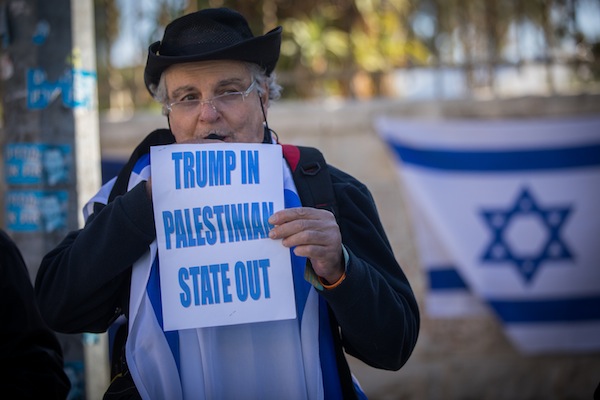Netanyahu built his career on the idea that only he can protect the Jewish people. Yet his silence in the face of Trump’s disregard for rising American anti-Semitism speaks volumes.

One year ago, former president Barack Obama delivered a speech on International Holocaust Remembrance Day in which he declared, “We are all Jews.” This is a far cry from the statement issued by the Trump Administration last week, which made no mention of Jews or anti-Semitism at all. White House Chief of Staff Reince Priebus has since said that he does not regret the omission, but that “obviously” all of the Jewish people were “affected in the miserable genocide.” Apparently so obvious it does not warrant mention. White House Press Secretary Sean Spicer went on to call the widespread backlash from both Jewish groups and Democrats as “pathetic” and added that “the president went out of his way to recognize the Holocaust.”
It is hard to say whether the omission was a deliberate calculation that, as Virginia Senator Tim Kaine and others have already deemed, “soft-core Holocaust denial,” or simply an incredibly insensitive and disingenuous oversight. But what I can say is that Prime Minister Benjamin Netanyahu’s silence on the matter is resounding. The Israeli leader who never misses an opportunity to invoke the Holocaust, anti-Semitism, or the threat of the elimination of the Jewish state has remained utterly silent on this matter.
This is the same prime minister who never missed an opportunity to criticize or outright undermine Obama. Yet in this case he seems to be going out of his way to avoid any criticism of Trump. When asked for comment, Netanyahu spokesperson David Keyes told me, “I don’t have anything on that.” Netanyahu’s silence is even more deafening considering that staunchly conservative, pro-Trump, pro-Israel hawkish groups like The Republican Jewish Coalition, and the Zionist Organization of America broke ranks and criticized the White House statement.
At Yad Vashem on International Holocaust Remembrance Day, Netanyahu implored: “Any person of conscience should speak out about resurgence of same attitude that decades ago openly said we are out to destroy Jewish people…. As prime minister of Israel I will not be silent, I have not been silent.” He only mentioned Europe and “the East.” When it comes to growing anti-Jewish rhetoric in the U.S., he has been deafeningly silent.
Where was he in the last few weeks as 48 Jewish institutions across the U.S. faced bomb threats? Why did he suddenly refrain from tweeting? Where was Netanyahu when Trump tweeted an anti-Semitic image of Clinton’s face superimposed on piles of money and a six-pointed Star of David? Where was Netanyahu when Trump essentially justified anti-Semitic attacks on journalist Julia Ioffe? And where has he been for the last year, with the upsurge in anti-Semitic hate crimes, the rise of the alt-right, unchecked neo-Nazi support for Trump, and his appointment of white supremacist Steve Bannon?
Netanyahu has already shown he has no problem commenting and imposing his views on Trump’s administration. Last weekend, he tweeted in support of Trump’s plan for a wall along the border with Mexico:
President Trump is right. I built a wall along Israel’s southern border. It stopped all illegal immigration. Great success. Great idea ????
— Benjamin Netanyahu (@netanyahu) January 28, 2017
Mexico’s Jewish community, which historically leans right, condemned Netanyahu’s comments and demanded an apology.
Netanyahu — who has branded himself more than any other Israeli prime minister in history as the representative and savior of the Jewish people — continues to be silent on the issues most important to them. Perhaps most disturbing is his decision to remain silent in the face of Trump’s executive order, signed on Holocaust Remembrance Day no less, banning entry into the U.S. to people from seven Muslim countries — a ban all too reminiscent of the ones Jews have faced, and a blow to all minorities in the country who started out as refugees and immigrants. The U.S. Holocaust Museum issued a statement condemning Trump’s ban and directly linking it to the situation in the 1930s and 40s. Jews across the U.S. have been protesting the ban by sharing stories of their grandparents who managed to flee persecution in Europe and reach the U.S. – as well as those who were turned away and perished. They have increasingly expressed that they feel unsafe and fearful under Trump, and Netanyahu is nowhere to be found.
Netanyahu’s silence on this issue speaks volumes about where his priorities lie. One likely answer is that he is focused solely on ensuring Trump’s support for continued settlement growth, disbanding the deal with Iran, the denial of Palestinian rights, and continued U.S. military aid – all at the expense of Jewish values.

It could be that Trump’s racist and exclusionary policies tacitly jive well with Netanyahu and Zionism’s fundamental vision that Israel is the only safe place for Jews in the world — the place they should and will eventually end up once the rest of the world spits them out. This demonstrates the dangerously smooth convergence between rising anti-Semitic white nationalism and the right-wing Zionism that Netanyahu is peddling. It exposes the fact that the Israeli leader isn’t interested in defending the rights of Jews as human beings, and that he is totally out of touch with the values of the majority of American Jews.
A much more appropriate statement from the self-proclaimed leader of the Jewish people would have been what was so eloquently stated last year by the former president with a Muslim middle name: “Because anti-Semitism is a distillation, an expression of an evil that runs through so much of human history, and if we do not answer that, we do not answer any other form of evil. When any Jew anywhere is targeted just for being Jewish, we all have to respond as Roddie Edmonds did — we are all Jews.”

